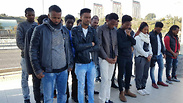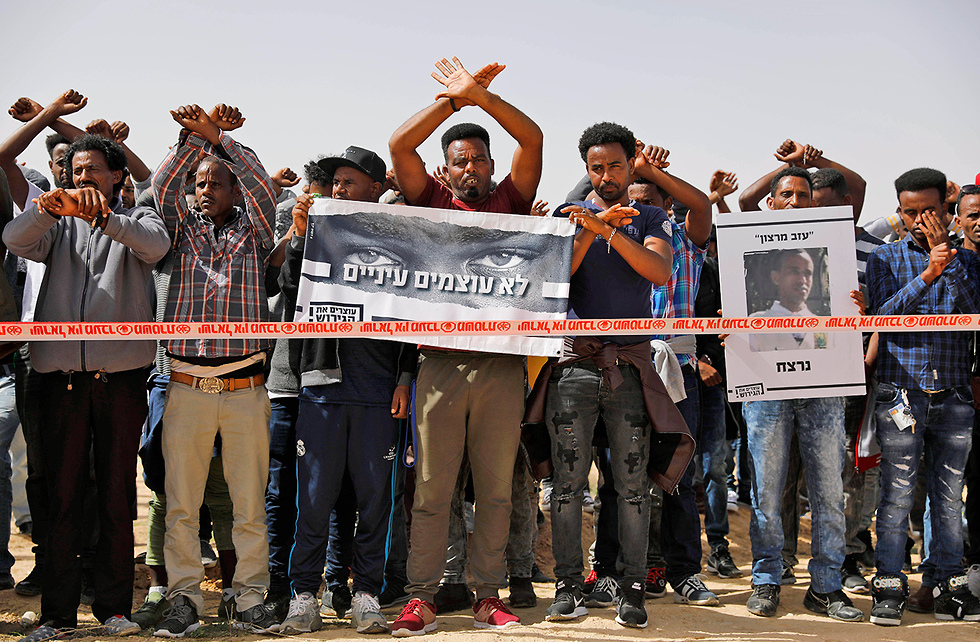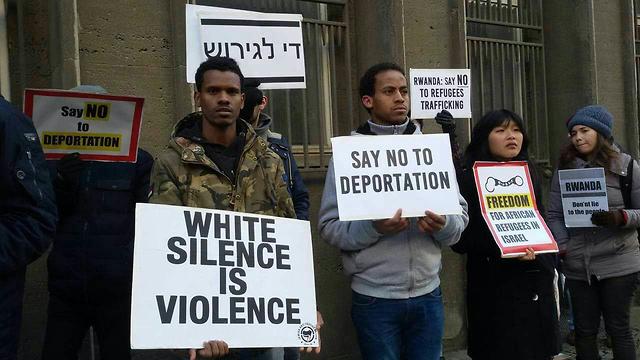
Anti-expulsion activists
צילום: "עוצרים את הגירוש"
UN human rights experts say mass expulsion violates international law
Calling the planned expulsion of Eritrean, Sudanese asylum seekers a violation of international law, human rights, refugees rights, UN human rights experts decry the 'discriminatory nature' of the policy aimed at sub-Saharan Africans, criticize stigmatizing terms such as 'illegal infiltrators.'
United Nations human rights experts released a statement calling Israel’s plan to expel Eritrean and Sudanese asylum seekers a violation of international law with respect to human rights and refugees rights. They called on Israel to immediately cease its implementation and change the plan.
“We are concerned that the plan will seriously harm the rights of the Eritreans and Sudanese, according to international human rights law,” they stated in their declaration. The signatories are independent researchers working voluntarily under the auspices of the UN Human Rights Council. Their expertise is in the human rights in Sudan and Eritrea, human rights of refugees, racism, discrimination, xenophobia and intolerance.
The declaration stated that Israel’s plan grants a temporary stay from expulsion to certain people, including particularly vulnerable immigrants, but their concern is that it can be annulled at any time and children and families can be included in the expulsion as well.
It also stated that some 20,000 out of 34,700 Eritreans and Sudanese in Israel must choose between leaving the country and indefinite imprisonment in Israel.
Assistant Professor of Law at UCLA Tendayi Achiume deplored the “discriminatory nature” of the policy: “I am deeply concerned that this policy specifically targets individuals from sub-Saharan Africa. By singling out Eritrean and Sudanese nationals, the policy clearly breaches the prohibition of discrimination on the basis of race and national origin,” she said.
The experts said the policy perpetuates the stigmatization of non-citizens as “illegal infiltrators”—a term that has been widely used by public officials in the debate about migration.
“The use of such terms reinforces and further legitimizes discriminatory public discourse and racist attitudes towards migrants, refugees and asylum-seekers, especially those from sub-Saharan Africa,” Ms. Achiume added.
The experts are also alarmed that the policy foresees the indefinite detention of those who refuse to leave Israel. “The detention of migrants should be an exceptional measure of last resort and respect procedural safeguards: it should be ordered by a court of law and be determined case-by-case, it should last for the shortest period of time, it should only be applied when no suitable non-custodial alternatives are available, and children should never be detained for immigration purposes, whatever their status or the status of their parents,” they said.
In light of the secrecy surrounding the third country destinations, the UN experts expressed concern that returnees might not be afforded adequate and effective protection.
“We call on Israel to respect the absolute prohibition of refoulement, which entails an obligation not to return a person, whatever their status, to a country where there are substantial grounds to believe that the individual would be at risk of being subjected to torture or other cruel, inhuman or degrading treatment or punishment, or other serious human rights violations,” they said.
In this context, the experts also noted the lack of sufficient guarantees ensuring that Eritreans and Sudanese are not deported from third countries to their country of origin. “We express great concern about the safety of thousands of Eritreans and Sudanese and the risks they face if returned to their home countries,” said the Special Rapporteur on the situation of human rights in Eritrea, Ms. Sheila B. Keetharuth, and the Independent Expert on the situation of human rights in the Sudan, Mr. Aristide Nononsi.
The UN experts have been in contact with the Israeli government to clarify the situation.
In November, 2017, the UN High Commissioner on Refugees criticized the government’s policy, even before it received final approval.












